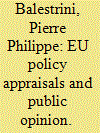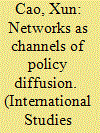| Srl | Item |
| 1 |
ID:
165547


|
|
|
|
|
| Summary/Abstract |
Although the literature about European Union (EU) public opinion is quite extensive, much of it focuses on general indexes of support for the EU or one specific EU policy area. The study of citizens’ appraisal of the EU contribution across socioeconomic policies and its interdependence is uncharted territory. The present article addresses this gap in the research. Using Eurobarometer data, it is demonstrated that national publics tend to be dissatisfied with the EU contribution across policies and that this assessment is consistent and interrelated from one policy to another. Education is found to have only a relatively modest impact on this assessment while the degree of an EU member state’s integration in the world economy is not found to sway the latter. The findings finally show that national levels of unemployment, immigration, income dispersion, and the positioning of party leaderships on social redistribution influence public opinion on EU policy input. In the light of these findings, implications are drawn.
|
|
|
|
|
|
|
|
|
|
|
|
|
|
|
|
| 2 |
ID:
099118


|
|
|
|
|
| Publication |
2010.
|
| Summary/Abstract |
This paper studies policy changes in capital taxation by focusing on policy interdependence induced by network dynamics at the international level. The empirical findings indicate that the competition mechanism induced by network position similarity in the network of portfolio investment and that of exports causes policy diffusion in corporate taxation; the socialization mechanism (policy learning and emulation) induced by network position proximity in the IGO networks also drives policy changes, and the evidence is much stronger in the IGO networks that facilitate policy learning than in those that facilitate emulation. The paper also discusses explicitly empirical challenges to incorporate network characteristics into connectivity matrices in spatial lag models often used to study policy diffusion. It suggests that students of policy diffusion should discuss as explicitly as possible the assumptions and procedures to construct connectivity matrices and present results from alternative specifications: our conclusion on the strength of policy diffusion is often sensitive to the choice of connectivity matrices.
|
|
|
|
|
|
|
|
|
|
|
|
|
|
|
|
| 3 |
ID:
179709


|
|
|
|
|
| Summary/Abstract |
The geopolitical implications of renewable energy involve changes beyond the immediate impact on energy and commodity streams. Energy policies of individual countries affect each other via different economic and political channels. This paper studies the role of renewable energy in EU-China relations, two leading powers in the field of renewable energy. Both polities have recently increased their individual ambitions towards decarbonisation of their domestic energy systems, and renewables play an increasingly important role in shaping their bilateral dealings. We therefore ask what influence renewable energy has on the relationship between both sides. To capture the effect, we employ the concept of policy interdependence in four areas related to renewable energy namely climate, energy, industry, and trade and investment policy. While these are often seen as separate fields, they are all related to renewable energy. Findings indicate that renewable energy has the potential to be a determinant of bilateral relations. Renewable energy contributed to greater alignment between the EU and China in the past, while increasing recourse to policy choices based on national priorities today creates obstacles to further cooperation. However, the patterns of policy interdependence identified in this study also suggest potential for renewed cooperation in the field of energy policy, depending on the capability of policymakers to see beyond the current structure of the bilateral relationship.
|
|
|
|
|
|
|
|
|
|
|
|
|
|
|
|